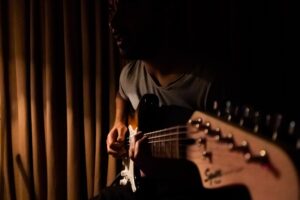
Acoustic Sciences: A Sound Career for Musicians
If you work in the acoustical sciences field, you usually have colleagues passionate about music. Whether you play an instrument, sing or produce music, acoustics is a great career choice for anyone naturally inclined or enthusiastic about music.
The team at Aercoustics Engineering is no exception. We have an incredibly musical office. It’s not uncommon for casual office events to turn into full-blown jam sessions – drum kit and all. One team member used their musical insight to design The Bridge, our state-of-the art listening room which provides owners, architects, engineers and contractors the ability to experience their spaces before they break ground.
Music has been my main passion since I was 14. I played the piano before learning the guitar, ukulele, bass guitar, and trumpet, then moved into singing, rapping and producing music. My first studio recorded project was actually with someone I now work with at Aercoustics. It was that connection that eventually brought me to the company.

I had just finished my degree in history and political science, and a couple of months after graduating was offered an opportunity to use my writing and design skills at Aercoustics, working with people who shared a passion for sound and music. The design skills I used to make and market my own album turned out to be beneficial to my job as a proposal writer. While my work at Aercoustics doesn’t typically involve acoustic design, I did get the chance to develop ambient “soundscape music” for a client’s design installation two years ago. The installation actually won a German design award.
On the flip side, a lot of the things I learn from the people I work with help me to improve my recreational vocation. I have learned how certain frequencies will work in a room, the importance of audio quality and projecting my vocals, and how to ensure the room is not overly reverberant: all of which helps with my recording.
I’ve also learned that room acoustics can be almost as important as the equipment you record with. With my work experience at Aercoustics, I am always concerned about HVAC sound when recording. When I listen to my older recordings before Aercoustics, there is often a noticeable hiss in the background. I didn’t realise this before. Many amateur musicians assume that if they don’t notice a sound, it won’t impact their recording. Now, I don’t hit record without turning off the A/C. My work experience has also educated me about the issues with shared partitions. Ideally, you want to professionally isolate your recording space to avoid any noise intrusions. The closest I could come to this was selecting a standalone house with no shared walls. Skills that I have gained from my work on the business development side have also really helped me to rebrand and put out a more professional image as musician.
Many at Aercoustics will tell you that not only has their music improved from the lessons they learn through their professional work, they find the work they do for clients benefits from their experience in music. Understanding the needs of people in the music industry and the challenges for performance and recording venue acoustics allows us to deliver results we’re truly in tune with. Personally, working with people who love music means I always have a team mate interested in hearing my music and supporting my work.
More from Aercoustics employees who have tied a career around their personal passion of music.
Ben White
Musical Interest: Plays the drums in a band, plays piano and sings
“A big part of being an acoustical consultant who works with architects is understanding how a space will be used and having a background as a musician is really helpful in designing spaces which will be used for music and recording. Firsthand experience helps with understanding what musicians will want from a space, and what is really important when designing a space.”
 Dave Grant
Dave Grant
Musical Interest: Jazz piano, recording
“Being trained to listen actively to music and pay attention to small details in sound has translated into being better able to observe acoustic phenomenon in the wild. For example, picking out subtle tonal components of sound from an operating machine without needing a spectrum analyzer. Additionally, much of the signal processing theory I learned from music recording and production is directly applicable to processing and analysis tasks necessary in acoustics consulting engineering such as filtering, gain staging, phase-shifting, digital signals and systems. Much of what I observed from experimenting with microphone placement around an instrument in a recording space led to an awareness and intuition about how sound propagates from a source in different environments.”
Doreen Abraham
Musical Interest: Singing, piano, and recording
“My musical hobby was the reason I became interested in working in acoustics. It’s a career that perfectly bridges my interest in math/science with my love for playing and singing music. I think my background and ongoing work with music helps make my job so much more interesting because the concepts, theories and modelling are not just numbers and formulas, but they have meaning beyond my computer screen. I find that in any space that I am performing, I have a better appreciation for what’s happening in the room and my mind is always thinking about the design of the space, be it good or bad.”
Sean Syman
Musical Interest: Guitar and lap steel; started building acoustic guitars and slides when he was 18
“Guitar building was the passion that pushed me towards acoustics, as a perfect combination of engineering and sound. Having a good grounding of how instruments behave has been hugely beneficially in designing performance spaces, and I’ve been able to take the things I’ve learned as an acoustician back to experiment with different guitar designs.”




